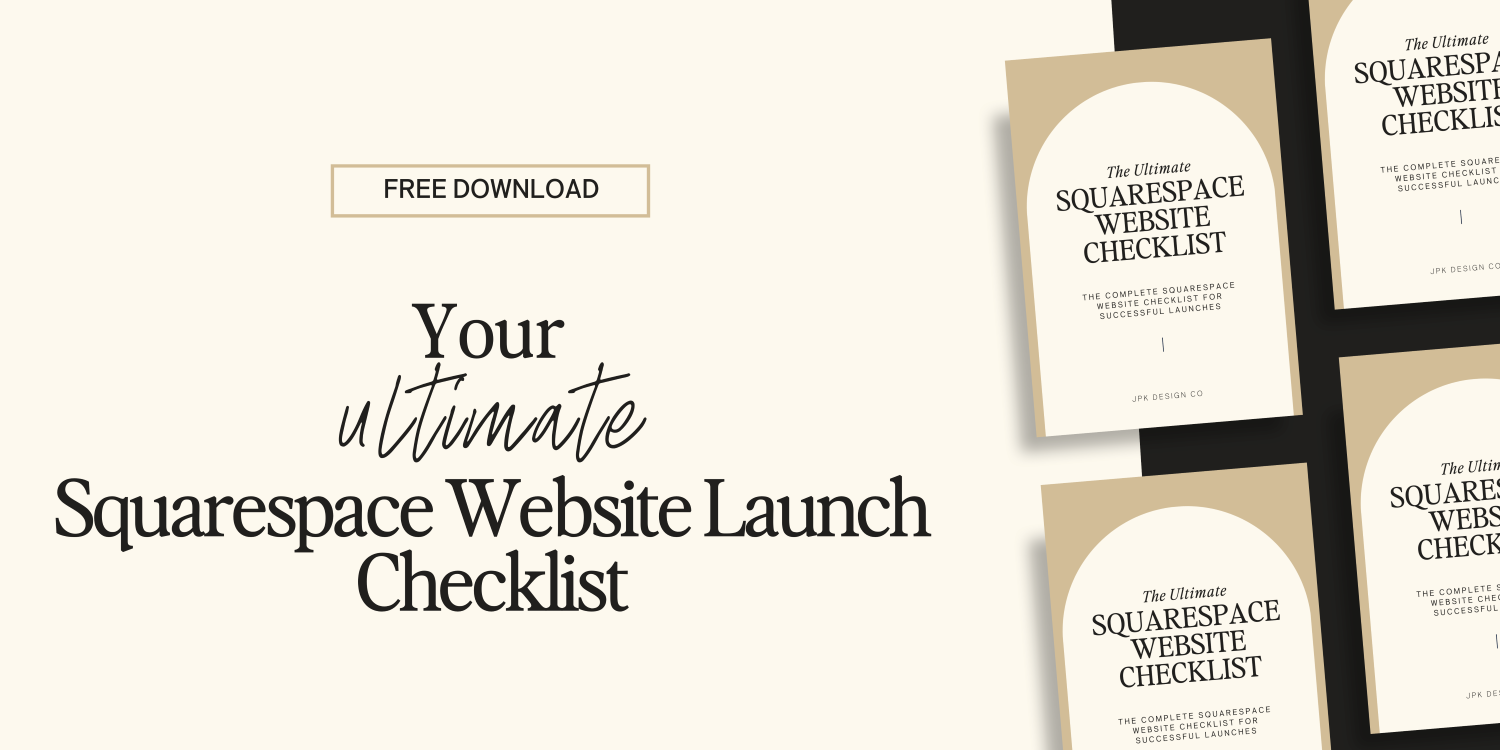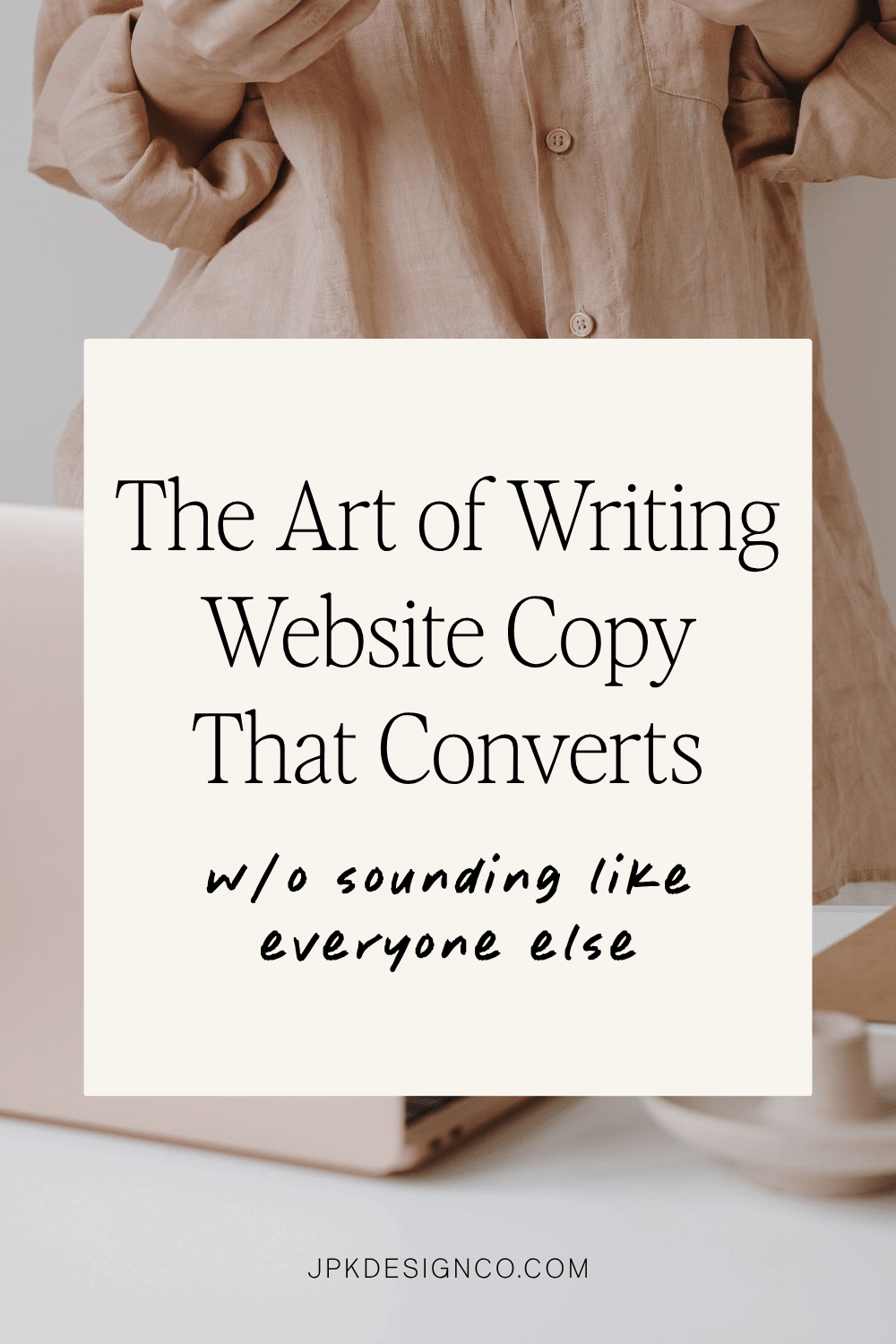The Art of Writing Website Copy That Converts (w/o Sounding Like Everyone Else)
Copy is one of the key components of a successful website.
It's how your brand speaks, shares what's important, and lets folks know about your brilliant offerings. It's about getting your message and values out there to your future peeps!
But here's the thing...
In our world of fleeting attention spans and fierce competition (where everyone and their cousin has a website), crafting copy that actually stops the scroll and nudges people into action, while staying true to your authentic vibe and keeping it un-sleazy isn't just nice to have.
It's make-or-break.
And if you're anything like most business owners I know, you're probably staring at your screen right now thinking, "Cool, but HOW do I write words that don't sound like every other website out there?"
Cue the crickets 🦗
Look, I get it. Writing about yourself and your business feels awkward. Like trying to give yourself a compliment in the mirror while someone watches.
But here's the thing: website copy that converts isn't about being the best writer. It's not about fancy words or perfect grammar.
It's about knowing exactly who you're talking to and what keeps them up at 3 AM scrolling their phone.
So today, let's talk about how you can ace the game of penning powerful website words, shall we?
01. Know Your Audience (Like, REALLY Know Them)
Crafting great website copy begins with getting into the hearts and minds of your people. And I'm not talking about that surface-level "women aged 25-45 who like yoga" nonsense.
I'm talking about knowing:
What they mutter under their breath when their alarm goes off Monday morning
The exact phrase they type into Google at 11 PM
What they screenshot and send to their best friend
The dream they're too embarrassed to say out loud
What does that mean?
Well, what are they struggling with? What do they want? What makes them roll their eyes? What makes them think "OMG YES, FINALLY SOMEONE GETS IT"?
Here's the thing most people miss: your ideal client isn't looking for another "transformational experience" or to "unlock their potential." 🙄
They're looking for someone who understands that they just want to:
Build a business without sacrificing their entire social life
Make good money without feeling like a used car salesman
Create something meaningful without the burnout
Dig into your audience's actual world (not the Instagram-filtered version) to find out what really drives them and what hurdles they're actually jumping over. Use these nuggets to whip up copy that speaks directly to their needs and desires.
✍️ QUICK TIP: Wanna know how to do the research? Here are my top two methods:
1. Become a digital anthropologist Join groups where your audience hangs out. Pop into Facebook groups, Subreddits, Discord servers... wherever your people gather to complain, celebrate, and ask for advice. Pay attention to:
Their actual language (not what you think they say)
The emojis they use (or pointedly don't use)
What they complain about on Mondays
What they celebrate on Fridays
The questions they ask over and over
2. Just... ask them If you have a friendly following on your own networks like Instagram, TikTok, YouTube, or your email list, send out a poll or survey with targeted questions. But here's the key: don't ask boring questions.
Instead of: "What are your biggest business challenges?" Try: "Finish this sentence: I would pay good money for someone to just handle _____ for me"
I use Tally for this! (That's an affiliate link, but it's totally free to sign up.)
02. Focus on Benefits (Way More Than Features)
One classic blunder in website copywriting? Going overboard on features and skimping on benefits.
Say you're catching up with a friend over coffee, and they won't stop talking about their new espresso machine. They go on and on about the "15-bar pressure pump, dual boiler system, and commercial-grade portafilter."
Your eyes glaze over. You start planning your escape route to the bathroom.
Now imagine instead they said: "I haven't bought a $7 latte in three months, and honestly? My morning cappuccino is better than anything I've gotten at that bougie place downtown. Plus I make them in my pajamas."
Suddenly you're interested, right?
That's the difference between features and benefits.
Here's the breakdown:
⚡Features are the characteristics or attributes of a product or service. These are the physical or tangible aspects that the product or service has.
⚡Benefits, on the other hand, are the positive outcomes that the customer will experience as a result of using the product or service. Benefits tell your customer how those features are gonna make their lives a whole lot sweeter.
Real-world examples to make this crystal clear:
Web design service:
Feature: "Mobile-responsive design"
Benefit: "Your site looks gorgeous whether someone's stalking you from their phone in bed or checking you out on their work computer"
Online course:
Feature: "6 modules with video lessons"
Benefit: "In 6 weeks, you'll go from 'what's a sales funnel?' to booking your first $5K client"
Email templates:
Feature: "15 customizable templates"
Benefit: "Stop staring at a blank screen for 20 minutes every time you need to email a client"
The secret sauce: Connect every feature to a real-life moment.
Don't just say your course includes "lifetime access."
Say "Binge it all in a weekend or take 6 months; life happens, and your access doesn't expire when your kid gets the flu."
Don't just mention "weekly group calls."
Paint the picture: "Every Thursday at 2 PM, bring your messiest client situation and leave with a clear game plan (and probably some new friends who get it)."
In short, features describe what the product or service has, while benefits explain why your people should care and how it will improve their life.
It's important for business owners to focus on benefits in their marketing and messaging, because customers are more interested in HOW a product or service can solve their problems or meet their needs, rather than just its features.
Your audience doesn't care about your process. They care about their outcomes.
03. Write for Scanners
People don't read websites. They scan them.
Stop.
Read it again:
People don't read websites. They scan them.
If there's one thing I can impress on you in this post, it's that. People don't want to read a novel on your website! They want to know who you are, what you offer, and how you can help them. That's it.
Think about how you read websites. Be honest. You:
Skim the headlines
Maybe read the bold bits
Check the price
Bounce if nothing grabs you in 3 seconds
And your visitors? They're doing the exact same thing.
Here's how to write for the way people actually consume content:
Make it skimmable AF
Short paragraphs (2-3 sentences max)
Bullet points for anything list-like
Bold the important stuff (but not everything, or nothing stands out)
Subheadings that tell a story on their own
Lead with the good stuff Don't bury your best point in paragraph 4. If you help people make $10K months, say it up front. If you can solve their biggest headache in one session, lead with that.
Use pattern interrupts
Ask questions. (See what I did there?)
Start sentences with "And" or "But"
Throw in the occasional one-word sentence.
Nice.
White space is your friend Big blocks of text = instant overwhelm. Give your words room to breathe. Your readers' eyes will thank you.
✍️ PRO TIP: The "About Page Novel" Syndrome
If you have a lot to say and really want your visitor to know everything about your business, background, ideology, or services, don't put it on your About page.
Your About page isn't your autobiography. Save the full story for your blog, where people actually CHOOSE to read longer content.
Your About page should be more like a movie trailer, not the director's cut with commentary.
The Bottom Line: Stop Trying to Sound "Professional"
Here's what most website copy guides won't tell you: the most effective website copy doesn't sound like website copy at all.
It sounds like you're having coffee with your ideal client and saying exactly what they need to hear.
So ditch the corporate speak. Forget the buzzwords. Stop trying to "elevate" anything.
Instead:
Write like you talk (when you're being your best, most helpful self)
Be specific instead of special
Show personality instead of perfectionism
Solve real problems instead of manufacturing fancy ones
Because at the end of the day, your website visitors aren't looking for another "transformational journey" or "aligned experience."
They're looking for someone who gets them. Who speaks their language. Who can actually help.
And that's probably you… once you stop trying to sound like everyone else.
BOOK RECOMMENDATION
💡For a superb resource on copywriting, check out The Copywriter’s Handbook by Robert Bly (get the latest edition for examples that include ‘modern’ marketing like websites and email marketing lists).
Ready to put this into action?
Before you rewrite your entire website (don't do that), pick ONE page. Your home page hero section, maybe. Or your main service page.
Apply these three principles:
Write it for ONE specific person (not "everyone who needs websites")
Focus on what they'll get, not what you do
Make it so scannable a distracted person could get the gist while cooking dinner
Then? Test it. Share it with someone in your target audience. If they say "OMG, are you in my head?”… you've nailed it.
If they say "Oh, that's nice"… back to the drawing board.
Because nice doesn't convert. Connection does.

